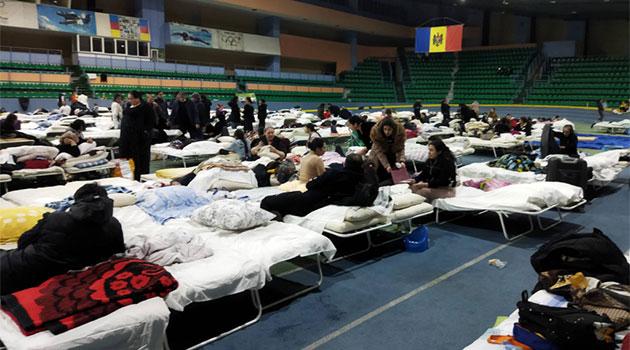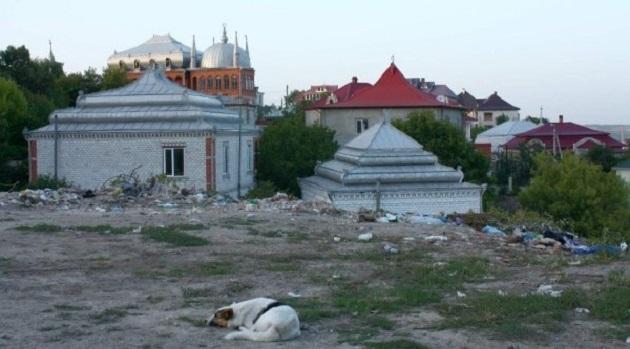ERRC: Romani Ukrainians fleeing into Moldova from Russian aggression are discriminated against for lack of personal identification

The news server Al Jazeera has reported on the discrimination and experiences of trauma during their journeys to safety that have been recounted to them by Cristina and Larisa, two of the more than 800 Romani people fleeing Ukraine who have ended up in a center for refugees in the Manej Sports Arena in the capital of Moldova, Chisinau. Romani refugee Cristina lost all her property when her home in Kharkiv was bombed.
She had no choice but to flee with her children. Now she is sitting in the middle of an indoor running track inside the sports arena without any documentation and has no idea what will happen to her and her children next.
“If a bomb falls on your house and you hear a tank shooting, what will you grab first, documents or your children?” Al Jazeera quotes Cristina as asking rhetorically. She traveled from Kharkiv to Lviv and then to the border with Moldova, where she waited to cross over to Moldovan teritory for four days living in a tent, in the cold, without food or water.
She also alleges that she and other Romani people were chased out of the tents they were sheltering in by Ukrainian border guards. Many Romani refugees have never had personal identification at all, others lost their ids during the war.
More than one Romani refugee Ukrianian told Al Jazeer that the most difficult thing is their families being split up, as family is the most precious thing to them. Larisa, another Romani woman fleeing Russian-occupied Ukraine, alleges she too was chased away by Ukrainian authorities armed with “big guns”.
“We slept in the cold together with our children. My son had a fever, but luckily they gave him pills,” said Larisa, describing four long nights spent sleeping in the family’s unlit basement in Kharkiv on planks above puddles of water.
In Lviv, where she and her family eventually ended up, she said there were so many refugees that they were unable to find enough bread to feed their family. She lost contact with her husband at the train station and has no idea where he is.
At the border, her son was taken into custody and conscripted into the Army of Ukraine. “I understand that this is the law, but without my son and husband, I cannot live,” Larisa said.
“How do you live? What am I to do? How can I live on without my children?” Al Jazeera quotes her as saying.
Extended Romani families are crowded into the Manej Sports Arena, some of which have as many as 50 members. It is impossible to find accommodation for such families due to their large numbers.
The deep family ties characteristic of this community of Romani people in Ukraine makes it categorically impossible for them to leave their family members behind in places where fighting is underway. According to volunteers, the authorities in Moldova have decided to separate the non-Romani Ukrainian refugees from the the Romani ones for cultural, linguistic and logistical reasons, in order to prevent tensions between the groups and better cover their specific needs.
The refugees are first brought from the Moldovan-Ukrainian border to the Moldexpa building, a former venue for international exhibitions that served until recently as a COVID-19 testing center. From this main reception center for refugees, where clothing, groceries and other donations are warehoused, the refugees are then taken by bus to other centers, such as Manej.
Al Jazeera reports that the authorities in Moldova are being “pressed to work out a resettlement plan for Roma refugees that does not require them to have documents”. Moldovan MP Dorian Istratlu, who has been coordinating the work at the Manej refugee center, has informed Al Jazeera that the Government is working on getting the Government of Romania to receive refugees from Ukraine who are Romani without documents.
“We are providing buses that will take them to a train so they can be transferred in Romania,” he said. “In Romania, they will register them as refugees and give them asylum.”
ERRC is following the Moldovan situation
The European Roma Rights Centre (ERRC) is following the situation of Romani refugees from Ukraine in Moldova. Their representatives have already visited three reception centers there that are being used almost exclusively to accommodate Romani refugees and a small number of other minority group members.
No non-Romani Ukrainians have been found to be present in any of those centers. The ERRC monitoring has also ascertained that the authorities in Moldova are transporting hundreds of Romani refugees from Ukraine to the border with Romania as quickly as possible by bus, that the Roma are not informed about how the immigration process works, and that they are frequently rejected for not having the correct documentation.
Children who are accompanied by adult family members who are not their parents are frequently denied entry, and those adult family members have faced accusations of trafficking. Others simply do not have passports or, in many cases, have no personal identification documents at all and have to remain in the reception centers, unable to travel on to join relatives living in the European Union and unable to return to their homes in Ukraine, according to the ERRC – which contradicts the information relayed by Moldovan MP Istratlu to news server Al Jazeera.
Furthermore, the ERRC monitoring inside Ukraine has confirmed that at the border crossing in the southwestern region of Zakarpattiya, people without identification are not being allowed to leave the country. That region is where the biggest population of Romani people in Ukraine are living, and many Roma IDPs and refugees are now at risk of being declared stateless for lack of identification.
The ERRC report notes that all of the states bordering Ukraine are bound both by the United Nations’ 1951 Convention on Refugees and 1954 Convention on Statelessness, which commit states receiving refugees to the duty of arranging documentation to replace missing passports if necessary. This right is further guaranteed under Article 14 of the Universal Declaration of Human Rights and in the EU, of which Romania is a Member State, by Article 18 of the Charter of Fundamental Rights of the European Union.
Authorities supervising border crossings do not have the right to refuse asylum to anybody, whether non-Romani or Romani, purely on the basis of their having no personal identification. Asylum law presumes that at a time of war, it is not likely that refugees would request travel documents from the authority issuing passports.
As the ERRC report notes, given that all authorities issuing passports in Ukraine are closed, as is the Ukrainian Embassy in Chisinau, these Romani refugees have no opportunity to acquire valid documents. The ERRC also points out that the EU decided on 4 March to activate the Temporary Protection Mechanism, guaranteeing all who are fleeing the conflict entry into the EU.
That mechanism makes it possible for authorities supervising border crossings to ease their controls, including when people do not have identification, and urges the Member States to issue declarations of arrival and/or temporary travel documents for undocumented people (in accordance with the obligations contained in the UN treaties). Currently it seems that this is not being applied in the case of Romani refugees from Ukraine on the border between Moldova and Romania, the ERRC concludes.
